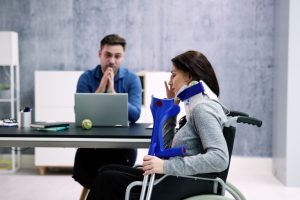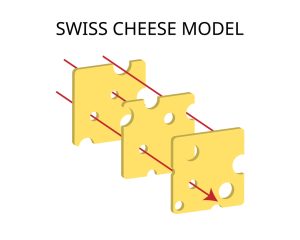Among your clients, what are the most common kinds of auto accidents that you have seen? What are the typical circumstances behind these?
Some of the most common types of auto accidents include:
- Rear-end collisions. These occur when one vehicle collides with another from behind. These types of accidents often happen when the vehicle in front stops or slows down, and the driver behind is unable to stop in time due to not maintaining proper speed and distance or not paying attention to the road.
- T-bone collisions. These occur when one vehicle crashes into the side of another vehicle. These types of accidents often occur at intersections when one driver fails to yield the right of way or runs a red light.
- Sideswipe collisions. These occur when two vehicles traveling in the same direction collide with each other. These types of accidents often happen when one driver changes lanes without checking their blind spot or signal their intention.
- Head-on collisions. This is one of the most severe types of accidents, when two vehicles traveling in opposite directions collide. These types of accidents often result in serious injuries and fatalities.
Some common causes of auto accidents include:
- Distracted driving. This includes any activity that diverts a driver's attention from the road, such as using a cell phone, eating, or adjusting the radio.
- Impaired driving. Driving under the influence of drugs or alcohol can severely impair a driver's ability to operate a vehicle safely.
- Speeding. Driving at excessive speeds increases the likelihood of losing control of the vehicle, particularly when road conditions are poor.
- Reckless driving. This includes behaviours such as tailgating, weaving in and out of traffic and ignoring traffic signals and signs.
In most cases, how is liability commonly determined in an auto accident?
Liability in an auto accident is usually determined by examining the facts and circumstances surrounding the accident. The following factors are typically considered when determining liability:
- Negligence. Negligence is the failure to exercise reasonable care, resulting in harm to others. In an auto accident, negligence can take many forms, such as speeding, running a red light, or failing to yield the right of way.
- Traffic laws. Drivers are expected to follow traffic laws and regulations, and violations of these laws can be used to establish liability.
- Eyewitness testimony. Witnesses to the accident can provide valuable information about the events leading up to the accident, which can help to establish liability.
- Police reports. Police reports often contain detailed information about the accident and may provide evidence to support liability.
- Expert testimony. Experts such as accident reconstructionists can provide analysis and testimony about the causes of the accident and who was at fault.
- Insurance policies. Insurance policies can provide information about coverage limits and exclusions that may affect liability.
In some cases, liability may be shared between multiple parties. For example, if both drivers were negligent, liability may be apportioned between them based on their respective degrees of fault. Ultimately, liability in an auto accident is determined by examining the evidence and applying legal principles to the case’s specific circumstances.
What are the usual timings and processes involved in litigating an auto accident?
The timing and process involved in litigating an auto accident can vary depending on the complexity of the case and the jurisdiction where the case is being litigated. However, the following are some typical timings and processes that may be involved in an auto accident lawsuit:
- Filing a claim. The first step in litigating an auto accident is usually filing a claim with the at-fault driver's insurance company. The claim will typically include a description of the accident, any injuries or damages sustained, and a demand for compensation.
- Investigation. The insurance company will investigate the claim, which may include obtaining police reports, interviewing witnesses and examining physical evidence.
- Settlement negotiations. Once the investigation is complete, the insurance company may offer a settlement to resolve the claim. If the parties agree to a settlement, the case will be resolved without going to trial.
- Filing a lawsuit. If the parties cannot reach a settlement, the injured party may file a lawsuit against the at-fault driver. The lawsuit will typically include a complaint outlining the legal claims and damages sought.
- Discovery. During the discovery phase, both sides will exchange information and evidence, including witness statements, medical records and expert reports.
- Pre-trial motions. Either side may file pre-trial motions to resolve legal issues before trial, such as motions to exclude evidence or dismiss the case.
- Trial. If the case proceeds to trial, the parties will present evidence and arguments to a judge or jury, who will determine liability and damages.
- Appeals. If either party is dissatisfied with the outcome of the trial, they may file an appeal to a higher court.
The entire process of litigating an auto accident can take anywhere from several months to several years, depending on the complexity of the case and the court's schedule. It is important to work with an experienced attorney who can guide you through the process and help you obtain the compensation you deserve.
What are the factors that affect the compensation a victim might receive?
The amount of compensation a victim might receive in an auto accident case depends on several factors, including:
- Severity of injuries. The extent and severity of the injuries sustained in the accident are a major factor in determining compensation. Serious injuries that require extensive medical treatment and result in long-term disability or impairment will typically result in higher compensation.
- Medical expenses. Compensation may include reimbursement for medical expenses related to the accident, such as hospital bills, doctor visits, rehabilitation and medication.
- Lost wages. If the victim is unable to work as a result of the accident, they may be entitled to compensation for lost wages or diminished earning capacity.
- Property damage. Compensation may also include reimbursement for damage to the victim's vehicle or other personal property.
- Pain and suffering. Victims may be entitled to compensation for physical pain and emotional suffering resulting from the accident, including anxiety, depression and loss of enjoyment of life.
- Comparative negligence. If the victim was partially at fault for the accident, the amount of compensation they are entitled to may be reduced in proportion to their degree of fault.
- Insurance coverage. The amount of compensation a victim can receive may be limited by the insurance coverage of the at-fault driver.
It is important to work with an experienced attorney who can assess the specific circumstances of the case and help ensure that the victim receives the maximum compensation to which they are entitled.
How would you advise a prospective client to act following an auto accident? What should their first steps be?
When involved in an auto accident, the following are some important steps to take:
- Check for injuries. Check yourself and any passengers for injuries. If anyone is injured, call 911 immediately and request medical assistance.
- Contact the police. Call the police to report the accident, even if it is a minor one. Ask for a copy of the police report.
- Exchange information. Exchange information with the other driver, including names, addresses, phone numbers, insurance information and license plate numbers.
- Document the scene. Take photos of the scene of the accident, including any damage to the vehicles and any skid marks or debris on the road. This can be helpful in determining liability and supporting a claim for damages.
- Seek medical attention. Even if you do not think you are injured, it is a good idea to seek medical attention after an accident. Some injuries may not be immediately apparent, and early diagnosis and treatment can be critical for recovery.
- Consult with an attorney. Consider consulting with an experienced auto accident attorney who can help you understand your rights and options and guide you through the claims process.
Remember, the steps you take immediately after an accident can have a significant impact on your health, safety and legal rights. Be sure to prioritise your well-being and follow these steps to protect yourself and your interests.
How would you advise a prospective client to act following an auto accident? What should their first steps be?
After an auto accident, there are several common mistakes that people make that can hurt their chances of receiving fair compensation for their injuries and damages. These mistakes include:
- Failing to seek medical attention. Even if you feel fine after an accident, it is important to seek medical attention. Some injuries may not be immediately apparent, and delaying treatment can make them worse. Additionally, failing to seek medical attention can hurt your credibility if you later file a claim for damages.
- Admitting fault or apologising. Even if you think you may have been partially responsible for the accident, it is important not to admit fault or apologise. This can be used against you in court or when negotiating with insurance companies.
- Failing to gather evidence. It is important to gather evidence at the scene of the accident, including taking photos of the damage, getting contact information for any witnesses and getting the other driver's insurance information.
- Delaying in reporting the accident. It is important to report the accident to your insurance company as soon as possible. Delaying this can cause problems with your claim later on.
- Failing to follow up with medical treatment. If you are injured in an accident, it is important to follow up with any recommended medical treatment. Failing to do so can hurt your credibility and your chances of receiving fair compensation.
- Accepting a quick settlement. Insurance companies may offer quick settlements to accident victims in an attempt to settle the claim for less than it is worth. It is important to consult with an attorney before accepting any settlement offers.
- Posting on social media. Anything you post on social media can be used against you in court. It is important to avoid posting anything related to the accident or your injuries on social media.
Avoiding these common mistakes and working with an experienced auto accident attorney can help protect your legal rights and maximise your chances of receiving fair compensation for your injuries and damages.
Violet Dersahakian, Lead Attorney
300 West Glenoaks Blvd, Suite 304, Glendale, CA 91202, USA
Tel: +1 818-797-1999
Fax: +1 818-484-2137
Violet Dersahakian is the founder and lead attorney of Progress Law Firm. Fluent in Russian, Armenian and English and conversationally fluent in Farsi, Violet immigrated to the US in 2002 and has since excelled as an accredited lawyer. She holds an associate degree, a paralegal diploma and license, a bachelor's degree and a law degree.
Progress Law Firm is a full-service firm specialising in personal injury and estate planning matters throughout the greater Los Angeles area. The firm also handles immigration cases nationwide.





















